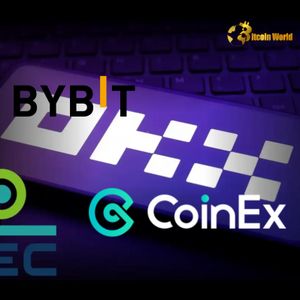Thailand SEC Unleashes Blockade on Bybit, OKX, CoinEx, and Other Crypto Exchanges
6 min read
BitcoinWorld Thailand SEC Unleashes Blockade on Bybit, OKX, CoinEx, and Other Crypto Exchanges Big news shaking up the crypto space in Thailand! The country’s financial watchdog, the Thailand SEC , is cracking down on several major international cryptocurrency exchanges. If you use platforms like Bybit, OKX, CoinEx, 1000X, or XT, this affects you directly. The Securities and Exchange Commission of Thailand has announced that these platforms will be blocked starting June 28, 2024, due to operating without the required digital asset business licenses. This move highlights the increasing focus on crypto regulation Thailand is implementing to protect investors and maintain market integrity. Why is the Thailand SEC Taking This Action? The primary reason cited by the Thailand SEC for this drastic measure is the operation of these platforms without proper licensing. In Thailand, engaging in digital asset business activities, including operating a cryptocurrency exchange, requires explicit approval from the SEC. This regulatory framework is designed to ensure platforms adhere to strict standards regarding security, compliance, anti-money laundering (AML), and know-your-customer (KYC) procedures. Operating without a license means these exchanges are not subject to the same oversight as licensed entities, potentially exposing users to higher risks. The SEC views unlicensed operations as a violation of the country’s digital asset laws. By blocking access and pursuing legal action, the regulator aims to: Protect Thai investors from potential risks associated with unregulated platforms. Ensure fair competition among digital asset operators, favoring those who comply with local laws. Strengthen the overall integrity and stability of the Thai digital asset market. Which Crypto Exchanges Are Affected by the Ban? The announcement specifically names five international crypto exchanges that will face the block. It’s crucial for users in Thailand to be aware of which platforms are included. The affected exchanges are: Bybit OKX CoinEx 1000X XT These platforms are popular globally, and many Thai residents have likely been using them due to their wide range of services, diverse altcoin listings, and sometimes competitive fees compared to local options. The impending block means users will lose access to their accounts and funds held on these platforms from June 28th onwards unless they take action. What Does This Mean for Users of Bybit, OKX, and CoinEx in Thailand? This is perhaps the most critical question for individuals using these platforms. The blocking action means that, from the specified date, users within Thailand may find it difficult or impossible to access the websites or mobile applications of Bybit , OKX , CoinEx , 1000X, and XT. This loss of access directly impacts their ability to trade, manage their portfolios, and most importantly, withdraw their assets. The SEC’s typical procedure in such cases involves requiring the blocked platforms to facilitate the withdrawal of assets for their Thai users within a specified timeframe before the block becomes fully effective. However, the statement also mentions pursuing legal action, which could complicate the process. Users should immediately check communications from these exchanges for specific instructions regarding asset withdrawal deadlines and procedures. Navigating Crypto Regulation Thailand: What Are Your Options? For users affected by the ban, understanding the current crypto regulation Thailand has in place is key to finding compliant alternatives. Thailand has a relatively mature regulatory framework for digital assets compared to some other countries. The SEC licenses and oversees several domestic digital asset exchanges and brokers. If you are a Thai resident using one of the blocked exchanges, here are some actionable steps you should consider immediately: Identify Your Assets: Log in to your Bybit, OKX, CoinEx, 1000X, or XT account (while you still can) and make a detailed list of all the cryptocurrencies and funds you hold on the platform. Check for Withdrawal Information: Look for official announcements from the exchange regarding the Thailand situation and withdrawal deadlines for Thai users. Act quickly, as time is limited. Withdraw Your Funds: Initiate withdrawals of all your assets from the affected exchanges to a personal wallet or to a licensed Thai digital asset exchange. Prioritize this step as access will be cut off. Explore Licensed Alternatives: Research and open accounts with digital asset exchanges that are licensed and regulated by the Thailand SEC. This ensures you are trading on a platform compliant with local laws. Examples of licensed exchanges in Thailand include Bitkub, Satang Pro (now Orbix Trade), Zipmex (currently under rehabilitation), and others. Stay Informed: Keep an eye on official announcements from the Thailand SEC and the affected exchanges. Regulatory situations can evolve. Transitioning to a licensed platform is crucial for continued participation in the Thai crypto market in a compliant manner. Comparing Regulatory Approaches: Thailand vs. Global Trends Thailand’s approach to digital asset regulation reflects a global trend where regulators are increasingly scrutinizing cryptocurrency platforms. Many countries are implementing licensing regimes to bring exchanges under regulatory purview, similar to traditional financial institutions. This aims to mitigate risks such as money laundering, terrorist financing, market manipulation, and investor fraud. While some jurisdictions take a more permissive stance, others, like Thailand, are adopting stricter measures to ensure compliance. The action against Bybit , OKX , and CoinEx , among others, serves as a stark reminder that operating in any country requires understanding and adhering to its specific legal and regulatory requirements. Exchanges that fail to do so risk facing similar consequences. The benefits of regulation, from a governmental perspective, include enhanced investor protection through mandated security standards, segregation of client funds, and robust compliance frameworks. Challenges include the potential for stifling innovation if regulations are too stringent and the difficulty of enforcing rules on borderless internet platforms. What Happens Next? Legal Action and Market Impact The Thailand SEC has stated it will pursue legal action against the non-compliant platforms. The exact nature of this legal action was not detailed in the initial reports but could involve formal complaints, investigations, and potentially penalties or further restrictions. This adds another layer of complexity to the situation, particularly for the exchanges involved. The market impact within Thailand could see an increase in trading volume on licensed domestic exchanges as users migrate their funds. For the blocked international exchanges, losing access to the Thai market represents a loss of users and potential revenue. The news also sends a strong signal to other international platforms operating in Thailand without a license that they risk similar enforcement action. Ensuring Compliance in the Digital Asset Space This situation underscores the critical importance of compliance for any business operating in the digital asset space, especially across different jurisdictions. For international exchanges like Bybit , OKX , and CoinEx , navigating diverse regulatory landscapes is a significant challenge but a necessary one for sustainable global operations. For users, it highlights the importance of using regulated platforms to ensure their assets are protected under local laws. As the digital asset market continues to evolve, we can expect regulators worldwide to refine their approaches. The focus on licensing and investor protection is likely to remain a key theme in crypto regulation Thailand and beyond. Summary: The Clock is Ticking for Unlicensed Crypto Exchanges in Thailand In conclusion, the Thailand SEC’s decision to block access to Bybit, OKX, CoinEx, 1000X, and XT from June 28th is a major development stemming from their operation without the required digital asset business licenses. This action is part of Thailand’s broader efforts to strengthen crypto regulation Thailand , protect investors, and ensure market integrity. Users of these platforms in Thailand must act swiftly to withdraw their assets before the deadline and consider migrating to licensed local exchanges to ensure continued, compliant participation in the market. The situation serves as a powerful reminder of the growing global trend towards stricter oversight of crypto exchanges and the consequences of non-compliance. To learn more about the latest crypto regulation trends, explore our article on key developments shaping the global crypto market institutional adoption. This post Thailand SEC Unleashes Blockade on Bybit, OKX, CoinEx, and Other Crypto Exchanges first appeared on BitcoinWorld and is written by Editorial Team

Source: Bitcoin World



